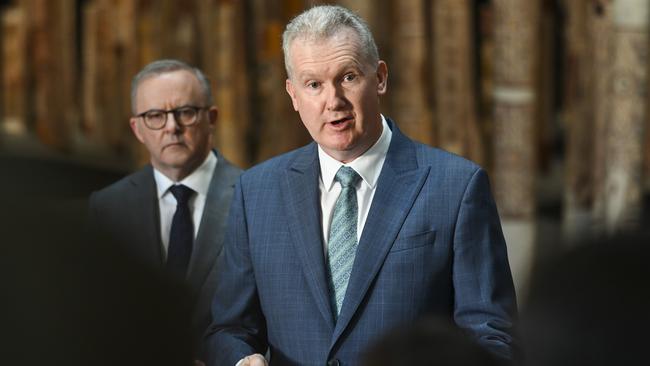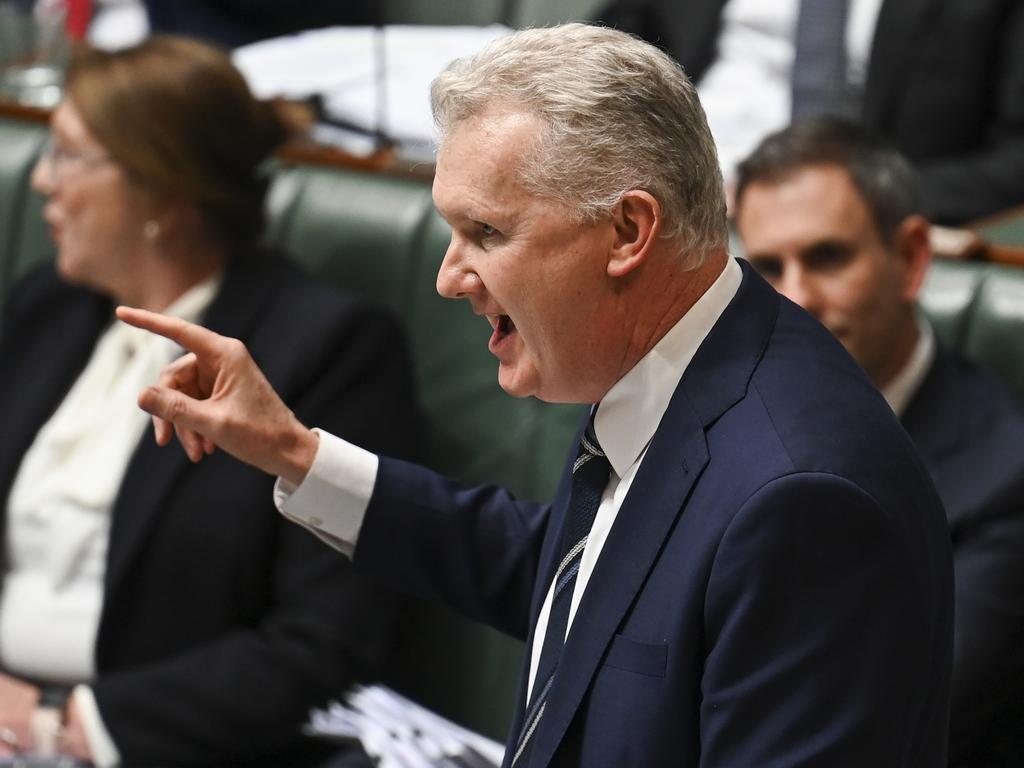Get ready for a lawyers’ picnic as IR changes kick in
Labor’s proposed workplace reforms will overturn settled arrangements across industry. The costs for employers to comply will be immense.

The demand for legal advice will soar as affected parties figure out how to interpret and work with the numerous legislative amendments likely to be passed before the end of the year. Lawyers will get rich, some unionists and workers stand to gain, but many firms and individuals will be adversely affected by what Employment and Workplace Relations Minister Tony Burke misleadingly describes as closing loopholes.
The reality is different: the proposed changes – we haven’t seen the legislation yet – will overturn settled arrangements right across industry, but particularly in mining, the waterfront, the airlines, the gig economy and road transport. There also will be uncertainty for those industries that employ large proportions of casual workers, most notably in retail and hospitality. The costs for employers to comply with the new rules and regulations will be immense.
The material presented on the Department of Employment and Workplace Relations website has the simple title, Reform, and outlines 11 measures for consultation. It reads like a wedding registry for the trade unions, a list of all their preferred, self-serving changes.
The unions expect the government to deliver. They failed in 2019 with the unconvincing but well-funded Change the Rules campaign, but the demands made then have not been forgotten.
It is worth noting that the trade unions face an existential challenge. Overall unionisation is below 13 per cent and well below 10 per cent in the private sector. In the early 1990s, overall unionisation was just over 40 per cent.
With the exception of a few parts of the economy – large-scale construction, parts of mining, utilities, nursing, teaching and the public service – the unions are largely irrelevant as far as workers are concerned. Several unions are struggling financially, robbed of the steady flow of union dues.
Having attempted various recruitment campaigns through the years, all essentially unsuccessful, most union leaders hold the view that regulatory favouritism is the only way forward. Without legislation that is deliberately slanted to deliver the unions’ agendas, their power will be further eroded, save for the potent role they play in industry superannuation.
There are consistent themes across the 11 nominated areas for consultation. They are:
• Employment relationships should be governed by employment/IR laws, not commercial contracts.
• Permanent employee of host employer should be the dominant employment status, with casual, fixed-term, independent contracting and labour-hire employment kept to a minimum.
• What happens during the course of employment should matter, not just what the worker and employer sign up to.
• Registered unions must have a protected right to intervene in any employment relationship.
Consider the issue of same job, same pay – Burke now prefers to call it “closing the labour-hire loophole”. You may have seen an advertisement in which two nursery workers must be paid the same, notwithstanding their different levels of competence and knowledge. It is being funded by employer groups. But the same job, same pay pledge is mainly targeting certain arrangements of large companies involving labour-hire firms. The trade unions strongly object to these deals, not retail workers in nurseries.
Coalmining in regional Queensland has been the epicentre of the issue, with companies regularly using labour-hire employees to supplement their workforces. These labour-hire employees are paid according to agreements reached with the labour-hire firms – they are paid much more than the award and well into six figures. But they are not covered by the enterprise agreement of the host company.
These set-ups irk the unions – in this case the mining division of the Construction Forestry Maritime Mining and Energy Union – partly because labour-hire employees are much less likely to join the union than company employees. Similar arrangements exist in other parts of mining, although in BHP’s case it runs its own internal labour-hire organisation. It is noteworthy that BHP has publicly opposed the same job, same pay initiative, estimating that the company would incur an additional $1.5bn a year in costs while crimping productivity. In the past, BHP has not been known to publicly oppose Labor’s IR policies.
Two defining issues are emerging in this debate. Should the definition of same pay simply be the base rate of pay or include all the other components, including bonuses? Should certain types of workers – say, those involved in maintenance – be exempt from the rule? The reality is that even if you accept the principle – and it’s important to note it’s highly contentious – it’s difficult to implement in practice, something the government and Fair Work Commission have known all along.
Confining the application to labour-hire companies doesn’t really clarify the matter because there still will be ambiguous cases – registered training organisations are an example.
One of the ironies with the current debate about IR reform is that some of the supposedly outstanding issues have been settled only recently by the High Court.
The vexed issue of whether long-term casual workers working regular hours should be eligible for paid leave was resolved – they are not. Similarly, whether the nature of work can override a contract between a company and a contractor was similarly settled – it cannot.
What the Labor government effectively is saying is it doesn’t like those rulings. The ACTU has gone even further by claiming the “surge in sham arrangements has been aided by … two High Court decisions in 2022 that overturned the definition of employee, making it easier for big business to mislabel employees as contractors – a loophole enabling them to cut pay and conditions”.
Another target of the government reform plans is the gig economy. While it is clear most gig economy workers are only supplementing their incomes – most have full-time jobs – unions, particularly the Transport Workers Union, are opposed to on-demand employment based on platform technology. Again, part of the reason is that these workers are disinclined to join unions, but the claim is made that workers lose out relative to being paid minimum wages and other award entitlements. The recent expansion of the gig economy to home-based services, including aged care, has stimulated the interest of other unions.
The government needs to tread carefully when considering the gig economy and industrial relations as an increasing number of people sign up with these platforms to supplement their incomes to make ends meet. One of the key attractions of the gig economy for the workers is the flexibility it provides, as well as the certainty and speed of payment.
The best-case outcome would be some changes related to insurance and independent dispute resolution so the workers can have faith in being treated fairly. Having said this, a separate deal between the government and one of the big platforms that includes some form of minimum wage guarantee should not be ruled out. There is a danger that such a deal will involve a strongly anti-competitive element in which some of the smaller platforms lose out.
Labor and the TWU are still smarting from the abolition of the Road Safety Remuneration Tribunal in 2016. The aim of this tribunal was to set minimum pay and conditions for long-haul truck drivers, the effect of which would have been to drive many owner drivers out of business.
A version of this arrangement has existed in NSW for years; it is only in NSW that the TWU is a thriving organisation with one of its roles the enforcement of the minimum rates. What is being proposed is that the NSW model is rolled out nationwide. Expect the large road transport companies to come on board as the livelihoods of mum and dad owner drivers are threatened yet again.
Buried in one of the consultation papers, Stronger Protections for Workers, is the shocking suggestion that all union officials and delegates should be exempt from any legal penalties for misconduct as long as their actions can be interpreted as “engaging in industrial activity”. In other words, it’s OK to violate the law as long as the individuals are seeking an industrial outcome, broadly interpreted. It’s akin to the statement made some time ago by ACTU secretary Sally McManus that breaking the law is fine if the law is a bad one.
The bottom line is that Burke had an easy ride getting the first tranche of IR changes through, including the surprise addition of multi-employer bargaining. This time employer groups and companies are wary and prepared to fight to ensure that any changes are workable and affordable.








Picture the scene. It’s a Maserati showroom. The employment/industrial relations lawyer has a big decision to make. Will it be red or black? It’s the inevitable consequence of the IR upheaval that is coming down the pike and the immense legal uncertainty it will create. You may have heard it referred to as same job, same pay, but it’s a great deal more.